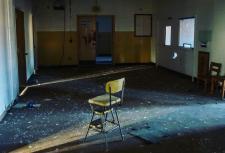
21st Century RE for All
We want every pupil to have the same entitlement to high quality, non-partisan education about religion and belief. We want to see all schools preparing young people for life in modern Britain by teaching pupils about the diversity of religious and non-religious worldviews.
We're campaigning for an end to the arbitrariness and unfairness of local determination in Religious Education and for a national religion and belief education syllabus as part of the National Curriculum.
What’s the problem?
Religious education is out of date and in need of reform. Almost thirty years after the introduction of a national curricular entitlement for all pupils, one subject remains exempt – religious education. Unlike any other compulsory subject RE is determined at a local level.
In each local authority the local agreed syllabus for religious education (RE) is determined by 'Standing Advisory Councils on Religious Education' (SACREs), largely made up of religious representatives, with non-religious representatives either excluded or barred from voting.
Even worse, many faith schools don't even need to follow the locally agreed syllabus, and can instead teach their own syllabus and teach religion from their own exclusive viewpoint.
If there is a body of knowledge called 'Religious Education', which is worthy of being taught at all, it should be offered to all children wherever they live. There are simply no grounds for discriminating on grounds of geographic location or school type. If a programme of study covering religion and belief deserves to be included in the school curriculum, it should be offered to all as a basic entitlement for every future citizen. This is simply a matter of fundamental justice and equality.
Importantly, the subject must be broad, balanced and inclusive. Religious interest groups should no longer determine what gets taught. As with other subjects, the syllabus should be nationally determined by independent educationalists without an agenda motivated by a specific religion or belief.
"The structures that underpin the local determination of the RE curriculum have failed to keep pace with changes in the wider educational world. As a result, many local authorities are struggling to fulfil their responsibility to promote high-quality religious education"
OFSTED report 'Religious Education: Realising the Potential'
Get involved
With the General Election coming up, as a nation we're thinking about our future. Please consider asking your candidate to support common sense secular reforms — such as reforming religion and belief education — that will make our society, education system, and laws fairer for all.
It’s time to take religious education in schools out of the hands of religious councils. Support a national entitlement to high quality, non-partisan education about religion and belief.
Sign the petition-
A selection of comments from the petition. Supporters on what this campaign means to them and the need to reform religion and belief education.
Find out more
NSS submission to the Commission on Religious Education
We’ve called on the Commission to support pupils’ basic entitlement to non-partisan education about religion and belief, and an end to RE controlled by religious groups or faith schools.
Religious Education and the law
RE is a statutory part of the basic curriculum in all schools, but is often shaped by local religious groups and faith schools.
Your rights: Withdrawal from RE and Collective Worship
We advocate comprehensive non-partisan reform of religion and belief education and an end to compulsory worship in schools, so no one has to withdraw from any part of the school day.
Why Religious Education must be reformed before ending parental opt-out
The right to withdraw from RE may sometimes be problematic, but is still necessary when until vestiges of confessionalism, proselytization and poor practice remain.
Standing Advisory Councils on Religious Education
Dominated by religious representatives, SACREs determine the RE syllabus at a local level.
Related news and opinion
NSS highlights religious barriers to inclusive education in NI
Posted: Mon, 15 Jan 2024 14:12
NSS response to inquiry calls for more integrated schools and more secular education system in Northern Ireland.
Unregistered school investigations nearly double in one year
Posted: Mon, 27 Nov 2023 14:57
Ofsted annual report also finds Religious Education in schools "not fit for purpose"
NSS urges government to replace “unpopular” RE
Posted: Tue, 19 Sep 2023 10:42
NSS letter follows lobbying from parliamentarians for more RE teacher training funding
NSS calls for change as RE “least useful” subject again
Posted: Fri, 14 Jul 2023 10:29
The National Secular Society has called for a rethink of religious education as polls again reveal the subject's unpopularity.
A poll last month revealed religious education (RE) to be one of the least popular school subjects, with over a quarter (28%) of those surveyed naming RE the least useful subject. Twenty-six per cent said they would remove it from the school curriculum.
In contrast, 88% said more needs to be done to educate children on personal finance. Sixty-three per cent of teachers said managing money should be added to the school curriculum.
The findings, from a survey of 2,000 adults via OnePoll on behalf of Discount for Teachers, are consistent with other recent research on RE. Last year a YouGov poll found 58% of Brits consider it not very important (31%) or not at all important (27%) to teach religious studies at secondary school.
A separate survey last year found 34% of academies in England do not include RE on the school timetable.
RE in England is regularly criticised as out of date and failing to be broad, balanced and inclusive.
It is the only compulsory subject that is locally determined, largely by religious interest groups. It is even less balanced in faith schools, which teach the subject in accordance with the religion of the school.
Some proponents of RE have resisted attempts to make it more balanced, inclusive and relevant by replacing it with a 'religion and worldviews' subject, similar to recent reforms in Wales. Two practitioners recently announced the creation of the 'Religious Education Network', which "rejects the downgrading of religion into just another world-view".
NSS: Replace RE with "more relevant and useful" subject
NSS chief executive Stephen Evans said the latest statistics support the growing concern that RE is "an outdated and unpopular subject area with no clear educational rationale".
He said: "It's no surprise that teachers and the wider public are wondering whether it wouldn't be better to replace RE with a subject which teaches more relevant and useful skills to the next generation.
"There is value in children and young people learning about a plurality of religions and beliefs. But a subject dedicated to religion is not necessary to achieve this.
"Education about the rights and responsibilities of citizenship, moral and political virtues such as civility and tolerance, and respect for human rights including freedom of religion or belief, will nurture greater harmony and social cohesion. These values should be promoted throughout our state schools.
"An outdated model of RE isn't the appropriate vehicle for this."
Image: Dragana Gordic, Shutterstock
Church plans to use schools to drive conversion of children
Posted: Tue, 4 Jul 2023 12:04
The Church of England has unveiled plans to use schools to drive recruitment of children and young people to Christianity.
In a document published on Friday, the Church said "courageous structural shifts in thinking and practice in education" will "contribute to the Church's vision to double the number of children and young people who are active Christian disciples by 2030".
The Church, which is embroiled in safeguarding scandals, has seen a dramatic decrease in membership, particularly among young people. The 2019 British Social Attitudes survey found just one per cent of 18-24 year olds in Britain belong to the CofE. Overall, less than 1% of adults in England regularly attend CofE services.
Education "central to the mission of the wider diocese"
The document recommends government leaders "further deepen the mutual partnership between church and state, at national, regional and local level, to enable the ongoing flourishing of church schools for coming generations".
It calls for dioceses to "provide an ambitious and expansive vision" for the role of the Church in education. This includes "the creation of new models of church in schools, which provide opportunities for children and adults to develop their journey of faith, through well planned pathways to discipleship".
"By creating and embedding strategic partnerships between churches and schools across the diocese, children, young people and their families can have the opportunity to grow in faith," it says.
It says diocesan leaders should ensure education is "central to the mission of the wider diocese", and should pay particular regard to religious education and collective worship.
The document says the Church's vision for education is "not just for Church schools" and that the Church will "continue to embrace vibrant partnerships with all major education institutions".
It adds that the Church "has a particular responsibility" to "safeguard the distinctive vision of its schools".
It also says school trust leaders should "celebrate equity, diversity, belonging, inclusion and justice". But many Church of England schools' admissions policies discriminate against children whose families do not belong to the Church. Research in 217 found one in four dioceses advise their schools to reserve some places on faith grounds. In 2013, the Fair Admissions Campaign found Church of England comprehensives whose admissions criteria allow full selection of faith admit 35% fewer children eligible for free school meals.
The Church has also been criticised recently for its homophobic and sexist policies.
Last month the UN Committee on the Rights of the Child (CRC) urged the UK to repeal compulsory collective worship laws and end the religious selection practised in faith schools.
NSS: 'Church regards our schools as mission fields'
National Secular Society head of campaigns Megan Manson said: "The Church has made it clear that it regards our education system as a mission field. Its latest plans reveal it wants to cynically use the state education system, which citizens of all faiths and beliefs pay for, to boost its plunging membership figures.
"Its desire to form even deeper links to the state can only further undermine secular democracy.
"These plans are highly inappropriate in such a diverse society, where Christians are now a minority.
"The government should stop giving the Church a free hand to pursue its own self-serving agenda in publicly funded schools. The purpose of such schools should be to educate, rather than inculcate pupils into a particular faith.
"And it should work separate Church and state rather than further entrench these ties."
For RE news stories click here.







